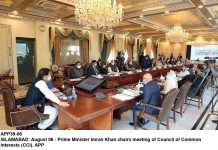Published on: August 18, 2025 10:32 AM

Prime Minister Shehbaz Sharif has directed chief secretaries across Pakistan to fully support the government’s push toward a cashless economy by expanding the Raast digital payment system. Chairing a review meeting in Islamabad, he expressed satisfaction with ongoing progress and emphasized that shifting transactions to a digital framework will strengthen transparency, reduce corruption, and make financial dealings easier for citizens. He said this transition remains one of the government’s top economic priorities.
During the meeting, officials briefed the prime minister on measures taken to encourage the cashless economy nationwide. They explained that under the Pakistan Digital Public Infrastructure, digital IDs will be created by integrating national identity cards, biometrics, and mobile numbers. This integration will enable citizens to use secure digital payments for routine transactions, reducing dependency on cash and improving efficiency in financial dealings across the country.
The participants also discussed the growing adoption of Raast at the provincial level. They noted that significant progress has been achieved in linking both government-to-public and public-to-government payments with the system. This includes services such as utility bills, taxes, and welfare payments, which will increasingly shift to digital platforms. Officials stressed that expanding Raast to district governments will speed up implementation and ensure benefits reach citizens at the grassroots level.
On digital infrastructure, the meeting was informed that the Capital Development Authority has already granted right-of-way for fiber optic connectivity in the federal capital. Additionally, negotiations are underway with Pakistan Railways and the National Highway Authority to extend fiber networks nationwide. Authorities believe these developments will provide the backbone for secure, high-speed internet, which is essential for the functioning of a modern digital economy.
Furthermore, federal ministers and senior government officials assured their full commitment to advancing this transformation. Finance Minister Muhammad Aurangzeb, Economic Affairs Minister Ahad Khan Cheema, IT Minister Shaza Fatima Khawaja, and other cabinet members highlighted ongoing initiatives in their respective departments. They pledged to coordinate efforts with provincial administrations, ensuring Pakistan moves steadily toward a fully digital and cashless economy that aligns with international standards and modern technological practices.
The prime minister concluded by reaffirming the government’s resolve to accelerate this shift, calling it a crucial step toward long-term economic stability. He emphasized that a successful digital economy will not only improve governance but also build investor confidence and expand financial inclusion. Officials noted that strong cooperation among federal and provincial institutions will be vital in achieving this national goal.









